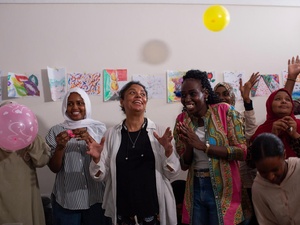Sudden drop in people fleeing Libya into Tunisia sparks new concerns
Sudden drop in people fleeing Libya into Tunisia sparks new concerns

A group of people heading towards the Libyan border with Tunisia. The outflow of people has slowed.
GENEVA, March 4 (UNHCR) - The UN refugee agency on Friday reported a sharp drop in the numbers of people crossing the border at Ras Adjir from Libya into Tunisia, and said it was increasingly worried at reports of people being impeded from fleeing.
As of mid-week, some 10,000-15,000 people were crossing the border daily, placing huge strains on the abilities of Tunisian authorities and humanitarian agencies to cope. But since Wednesday afternoon the numbers have fallen sharply. On Thursday, less than 2,000 people crossed.
"The border on the Libyan side is now manned by heavily armed pro-government forces," UNHCR spokesperson Melissa Fleming told a press conference in Geneva. "From those that did manage to cross the border, we have heard that mobile phones and cameras were being confiscated en route. Many people appear to be frightened and are unwilling to speak."
A rapid response from the international community to the joint International Organization for Migration humanitarian evacuation appeal of earlier this week has seen significant progress with the evacuation of Egyptians and other nationalities from Tunisia. Egypt, Tunisia, France, Germany, Italy, Spain and the United Kingdom have all offered air or sea transport.
The Egyptian government has repatriated tens of thousands of its own nationals. Australia, Austria, Belgium, Denmark, the European Commission, France, Germany, Luxembourg, Poland and Spain have offered funds for the UNHCR response to the Libya crisis. Private donations have also been coming in.
Around 12,500 people still need evacuation from Tunisia. More than 10,000 are from Bangladesh. Today, at least two flights are planned to Bangladesh. Fleming said that if Libyan military control of the border and roads reduces, a huge exodus of people could resume. Planning is under way to establish a second camp close to the border.
Meanwhile, a UNHCR team is currently in the eastern Libyan town of Benghazi as part of an inter-agency assessment mission. "They found a camp at Benghazi port where some 8,000 foreigners were awaiting evacuation. Evacuations were ongoing and while most expect to make it out in the next two days, there are 305 Eritreans, 191 Ethiopians and 153 Somalis who say they have been repeatedly blocked," Fleming said.
"Most are single young men, with 40 women and three children. They reported that although they faced significant problems in the past two weeks, empathy towards sub-Saharan Africans waiting at the port has increased," she added.
UNHCR teams in eastern Libya report that the Libyan Red Crescent is very active in providing assistance. They are also helping third country nationals and refugees to reach the border.
ICRC staff in Benghazi have told UNHCR that the most serious problem is a shortage of medical professionals in the region, with the majority of foreign medical staff having been evacuated. There is concern that fuel may start to run out in the next 15 days, with food shortages also anticipated in the coming weeks.












